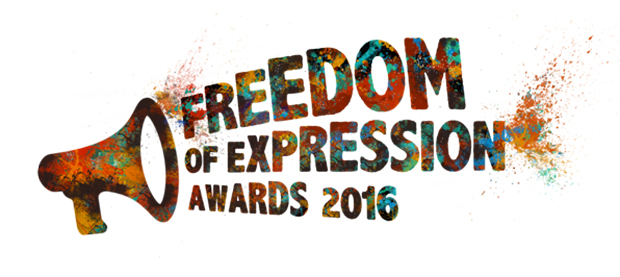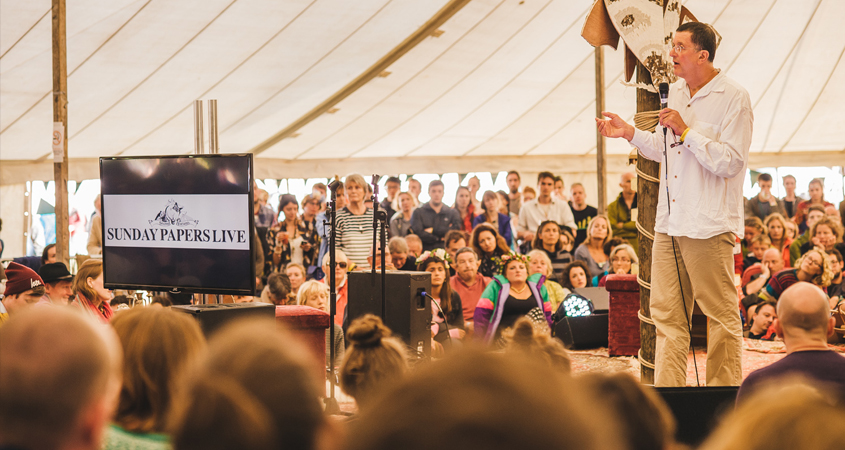15 Sep 2015 | Awards, Campaigns, mobile, Press Releases

- Awards honour journalists, campaigners and artists fighting censorship globally
- Judges will include poet and playwright Wole Soyinka, pianist James Rhodes and human rights lawyer Kirsty Brimelow
- Nominate at indexoncensorship.org/nominations
- Nominations are open from 15 September to 19 October 2015
Beginning today, nominations for the Index on Censorship Freedom of Expression Awards 2016 are open. Now in their 16th year, the awards have honoured some of the world’s most remarkable free expression heroes – from Israeli conductor Daniel Barenboim to Syrian cartoonist Ali Farzat to education activist Malala Yousafzai.
The awards shine a spotlight on individuals fighting to speak out in the most dangerous and difficult of conditions.
Index invites the public, NGOs and media organisations to nominate anyone they believe deserves to be part of this impressive peer group: a hall of fame of some of those at the forefront of tackling censorship worldwide.
There are four categories in Index on Censorship’s Freedom of Expression Awards:
• Arts for artists and arts producers whose work challenges repression and injustice and celebrates artistic free expression.
• Campaigning for activists and campaigners who have had a marked impact in fighting censorship and promoting freedom of expression.
• Digital Activism for innovative uses of technology to circumvent censorship and enable free and independent exchange of information.
• Journalism for courageous, high impact and determined journalism that exposes censorship and threats to free expression.
Winners will be flown to London for the gala ceremony, which will take place at The Unicorn Theatre in London on 13 April 2016. In 2015, the ceremony was hosted by comedian Shappi Khorsandi, with awards presented by judges and special guests including Martha Lane Fox, Mariane Pearl, Elif Shafak and Keir Starmer.
Winners also become awards fellows and receive support to amplify their work for free expression. As fellows, winners become part of a world-class network of campaigners, activists and artists sharing best practice on tackling censorship threats internationally.
Jodie Ginsberg, CEO of Index, said: “The Freedom of Expression Awards turn up the volume on the censored and silenced. I encourage everyone, no matter where they are in the world, to nominate a free expression hero so their voices can be heard.”
The 2016 awards shortlist will be announced in late January 2016.
Judges in 2016 will include Nobel prize-winning Nigerian poet and playwright Wole Soyinka; Kirsty Brimelow QC, a human rights barrister and chair of The Bar Human Rights Committee of England and Wales; and classical pianist James Rhodes, whose memoir Instrumental was published earlier this year after the UK Supreme Court overturned a publication ban.
Rhodes said: “The Russian poet Yevgeny Yevtushenko once wrote: ‘When truth is replaced by silence, the silence is a lie’ – and to honour those who fight to speak out and break that silence is a privilege. Having experienced first hand the terrifying impact of censorship, I’m thrilled to be able to play a small part in acknowledging the bravery of those who continue to express themselves in the face of unimaginable oppression.”
For more information on the awards, please contact [email protected] or call +44 (0)207 260 2660.
2 Sep 2015 | Academic Freedom, Magazine, mobile, Student Reading Lists
To tie in with the release of Index on Censorship magazine’s summer 2015 issue on academic freedom, Index put together a reading list of articles looking at the issues surrounding freedom of speech in universities from all over the world. Highlights include Kaya Genc’s examination of the Turkish universities that are restricting professors’ rights to teaching certain portions of history and Duncan Tucker’s look at the academics and students facing death threats in Mexico. There are also testimonies from young women who faced obstacles to getting an education.
All of these articles are taken from the special report of the summer 2015 issue of Index on Censorship magazine.
Students and academics can browse the Index magazine archive in thousands of university libraries via Sage Journals.
Academic freedom articles
Silence on campus: How a Turkish historian got death threats for writing an exam question by Kaya Genç
Kaya Genç, June 2015; vol. 44, 2: pp. 10-13
Index’s Turkish contributing editor discusses threats against professors that refuse to stick to the syllabus in Turkish universities
Universities under fire in Ukraine’s war by Tatyana Malyarenko
Tatyana Malyarenko, June 2015; vol. 44, 2: pp. 14-17
Academic’s jobs are under threat in Ukraine, Tatyana Malarenko discusses how many academics are being hauled in front of special committees and accused of terrorist activity
Industrious academics by Michael Foley
Michael Foley, June 2015; vol. 44, 2: pp. 18-19
Lecturer Michael Foley on the commercial pressures being applied to universities in Ireland
Stifling freedom: One hundred years of attacks on US academic freedom by Mark Frary
Mark Frary, June 2015; vol. 44, 2: pp. 20-25
Mark Frary takes us through one hundred years of attacks on freedom of expression in US universities
Stripsearch by Martin Rowson
Martin Rowson, June 2015; vol. 44, 2: pp. 26-27
Cartoonist Martin Rowson’s regular Index illustration looks at students being gagged at graduation
Ideas under review by Suhrith Parthasarathy
Suhrith Parthasarathy, June 2015; vol. 44, 2: pp. 28-30
In India, the autonomy of universities is being challenged by Prime Minister Narendra Modi amidst growing concerns of censorship
Girls standing up for education by Natumanya Sarah, Ijeoma Idika-Chima, and Sajiha Batool
Natumanya Sarah, Ijeoma Idika-Chima, and Sajiha Batool, June 2015; vol. 44, 2: pp. 31-33
Three female students from Uganda, Nigeria and Pakistan discuss their experiences of their own education systems
Open-door policy? by Thomas Docherty
Thomas Docherty, June 2015; vol. 44, 2: pp. 34-39
Government suppression of UK universities is becoming more and more of an issue, reports Thomas Docherty. Includes the students view by the editor of The Cambridge Tab Sarah Ivers.
Mexican stand-off by Duncan Tucker
Duncan Tucker, June 2015; vol. 44, 2: pp. 40-43
Journalist Duncan Tucker lays out the battle for academic freedom in Mexico, where death threats, harassment and beatings are commonplace in universities
Return of the Red Guards by Jemimah Steinfeld
Jemimah Steinfeld, June 2015; vol. 44, 2: pp. 44-49
Index’s contributing editor in China Jemimah Steinfeld reports from China where a targeted campaign against anyone who criticises the ruling party has recently moved to universities
The reading list for threats to academic freedom can be found here
25 Aug 2015 | Academic Freedom, Magazine, mobile, Nigeria, Student Reading Lists
Nigerian activist Ken Saro-Wiwa was one of the Ogoni nine, hanged in 1995 along with eight others by the Nigerian government for his continued protest against treatment of the Ogoni people. His death caused international outrage and sparked the banning of Nigeria from the Commonwealth of Nations for over three years. Since his trial and execution, Saro-Wiwa has become a pillar of free expression and many of his letters and short stories have been published in Index on Censorship, along with pieces about his life’s work. Most recently his son, Ken Saro-Wiwa Junior, published “A letter from Ken Saro-Wiwa” on the 20th anniversary of his death. This reading list groups together a collection of these works.
Students and academics can browse the Index magazine archive in thousands of university libraries via Sage Journals.
Silence on campus: How a Turkish historian got death threats for writing an exam question by Kaya Genç
Ken Saro-Wiwa articles
Ordeal by Innocence by Adam Newey and Ken Saro-Wiwa
Adam Newey and Ken Saro-Wiwa, November 1995; vol. 24, 6: pp. 164-166
Written while Saro-Wiwa was still on trial, Adam Newey writes about how many believe that he will be found guilty and sentenced to death. This is followed by an extract from a statement that Saro-Wiwa was prevented from reading out in court.
Corpses have grown by Ken Saro-Wiwa
Ken Saro-Wiwa, September 1997; vol. 26, 5: pp. 81-82
Taken from Saro-Wiwa’s collection, Songs in a Time of War
The new beggars by Ken Saro-Wiwa
Ken Saro-Wiwa, November 1996; vol. 25, 6: pp. 79-86
A short story based on Saro-Wiwa’s experience with one of the “new” types of beggars, those who tell touching stories in order to get money
Eyewitness by William Boyd
William Boyd on Ken Saro-Wiwa, December 2010; vol. 39, 4: pp. 93-96
British novelist William Boyd writes about his friendship with Saro-Wiwa and the international attention his cause gained in the 1990s
Letter to My Father by Ken Saro-Wiwa
Ken Saro-Wiwa, November 2005; vol. 34, 4: pp. 24-29
On the tenth anniversary of his father’s murder, Ken Saro-Wiwa Junior recalls events and reflects on what has (and has not) changed
The murderers in our midst by Adewale Maja-Pearce
Adewale Maja-Pearce, January 1996; vol. 25, 1: pp. 57-61
A detailed account of Saro-Wiwa’s execution alongside responses to Nelson Mandela’s call for Nigeria’s suspension from the Commonwealth
When knowledge is not enough by “Editorial”
Editorial, January 1996; vol. 25, 1: pp. 3
A short mention of Saro-Wiwa’s execution, and how publicity and knowledge of the volatility of the conflict was not enough to save the Ogoni nine
Letters- Blaming the victim by Ike Okonta
Ike Okonta, November 1997; vol. 26, 6: pp. 8-10
A letter focusing specifically on the role of Shell in Nigeria
Portrait of a Year by Caroline Moorhead
Caroline Moorhead, March 1996; vol. 25, 2: pp. 188-192
A look at Human Right’s Watch’s “authoritative and impressive” report on violations carried out by Shell in Nigeria
The Ken Saro-Wiwa reading list can be found here
30 Jul 2015 | Events

Secret Forum at Wilderness Festival
Leading cartoonists step into the ring with heavyweight commentators for a quick-thinking, rapid-fire, free speech fight club: should anything be off limits for cartoonists?
Featuring:
- Dave Brown (the Independent)
- Tayo (Nigeria)
- David Aaronovitch (The Times)
- Sameer Rahim (Prospect Magazine)
When: Sunday 9th August, 4.30pm
Where: Secret Forum, Wilderness Festival, Oxfordshire (Map/directions)
Tickets: available via Wilderness Festival
Presented in partnership with Sunday Papers Live




